|
|
|
 |
|
 |
| |
Martin
Suchy, M.Sc.
Candidate
TRACING GROUNDWATER RECHARGE THROUGH CULTIVATED
FIELDS USING VARIOUS ENVIRONMENTAL ISOTOPES
The use of both manufactured fertilizers and manures
as sources of nutrients in agricultural watersheds
has the potential to impact groundwater and surface
water quality.

In this study, environmental
isotopes and nutrient analysis are used to determine
agro-contaminant pathways, transformation and attenuation
in the subsurface within the intensively cultivated
Raisin River watershed of eastern Ontario. To
assess the significance of direct infiltration through
cultivated corridors, versus regionally recharged
groundwater, this research hopes to determine rates
of seasonal mixing. Monthly monitoring of key
geochemical and isotopic parameters will establish
temporal variations, and allow a reconstruction of
the seasonal variations of biogeochemical reactions
involving DOC and nitrogen species as they recharge
through cultivated landscapes. Naturally occurring
stable isotopes (δ18O and δ2H), which
are sensitive to seasonality of recharge, are being
used to examine seasonal variations and to provide
an estimate of recharge and mass loading to the aquifer. δ13CDIC
is used to distinguish water infiltrating through
fields where corn is grown (C4 vegetation), and natural
vegetation (C3 vegetation) predominant in the headwater
environments. δ15N and δ18O in nitrate
and δ15N in ammonium provide insight into denitrification
processes. Water levels were monitored and
groundwater samples collected from a network of multi-level
suction-lysimeters, piezometers, dug and drilled
wells, and tile drains, all located within or in
close proximity to three cultivated fields and one
naturally vegetated control site. The significance
of this investigation is that it may be used as an
analogue for other drainage basins in areas of intensive
agriculture.
-click to
see larger photos-
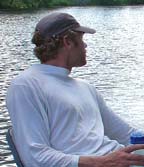
Boating on the Raisin
River
|
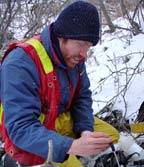
Sampling in winter
|
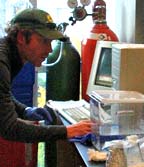
Sample analysis in the
lab
|
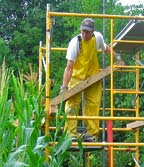
Building scaffolding
in a corn field
|
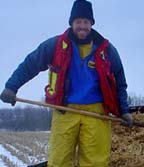
Farmer Suchy goes back
to his roots
|
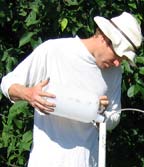
Field methods require
intense concentration
|
|
|
|
 |
|
 |
|
|
|
